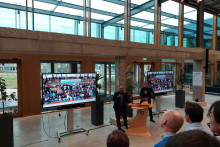For this reason the SU is organising a forum on the issue of housing on campus, in order to assess students’ opinions on the matter. The event will take place on Tuesday 27 October in the afternoon. ‘Finding suitable accommodation is an issue for any student, but international students will not be accustomed to the idea of ‘hospiteren’ and will tend to have more issues logistics-wise,’ says Rose Rorije on behalf of the SU.
Wellbeing
‘We aim for this forum to be an open platform for all participants, and to subsequently use our findings as arguments or counterarguments,’ Rorije continues. That being said, she will not comment on any plans the University of Twente (UT) might have to abolish these co-option meetings.
She does, however, stress that the Union is against such plans. ‘The students’ wellbeing comes first,’ Rorije explains. ‘A house should feel like a home, and ‘hospiteren’ gives you a say in the matter of who will become your new housemate, instead of them being assigned to your house. Many students prefer having the opportunity to meet their prospective housemates in advance and choose their best match, while others are not that picky and would welcome anyone as a housemate.’
‘A relevant, rather than critical discussion’
Sander Lotze, Head of Internationalisation (Strategy and Policy), believes that abolishing the practice of ‘hospiteren’ is not an issue at this stage. He labels the forum a ‘useful and relevant, rather than critical discussion.’
Lotze explains that currently, international students are put on a waiting list and, subsequently, the International Office looks for a room on campus for them. After one year, these students need to find accommodation on the ‘free market’. And this is when Acasa comes in – an organisation that helps these students find a new room on campus.
As for the co-option meetings, those are – in principle – not the UT’s concern, in Lotze’s opinion. ‘That is an agreement between students and Acasa as an accommodation provider.’ Acasa adds that at the moment, there are no plans to abolish this practice, which, Lotze concludes, has been a sensitive issue in the past.







